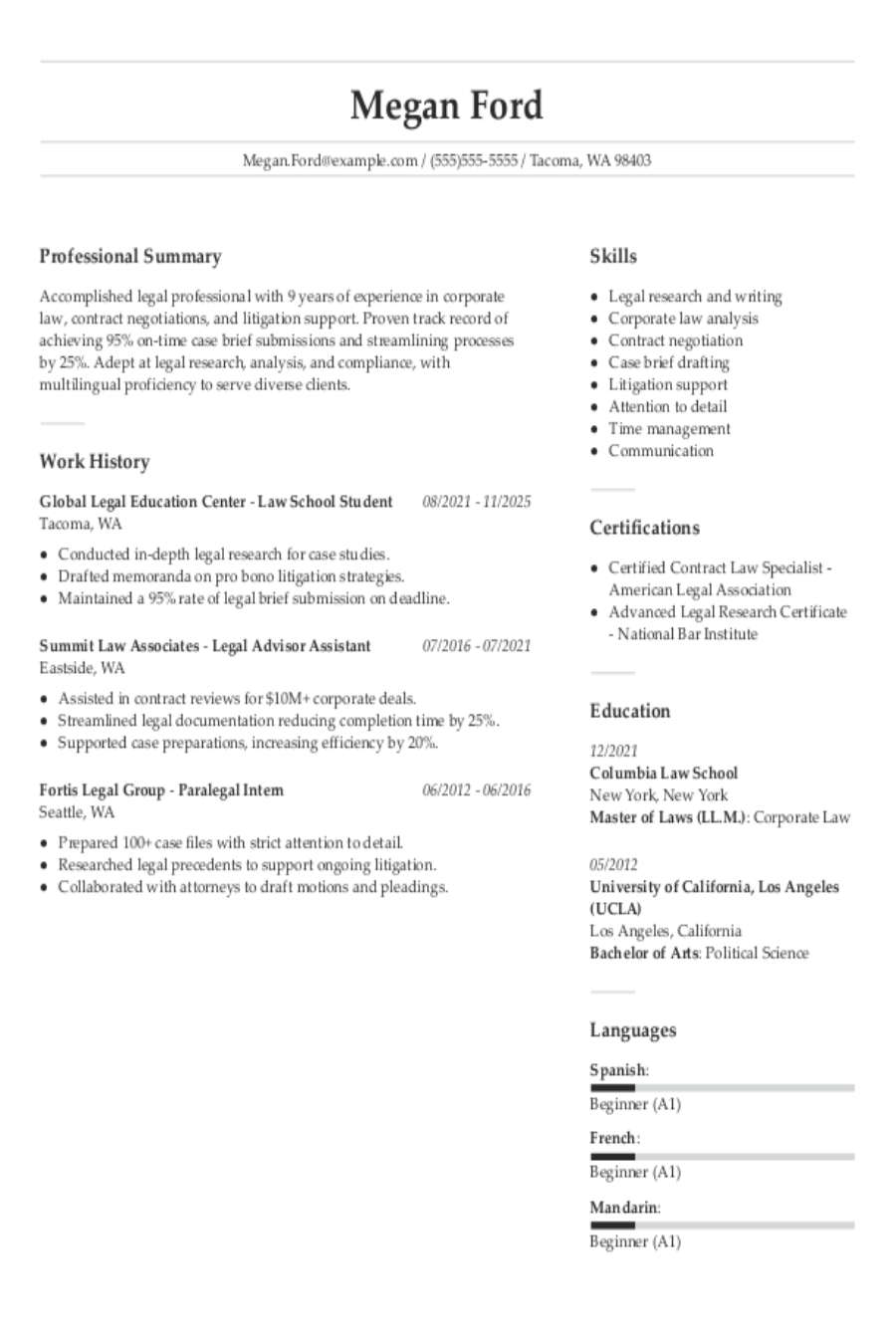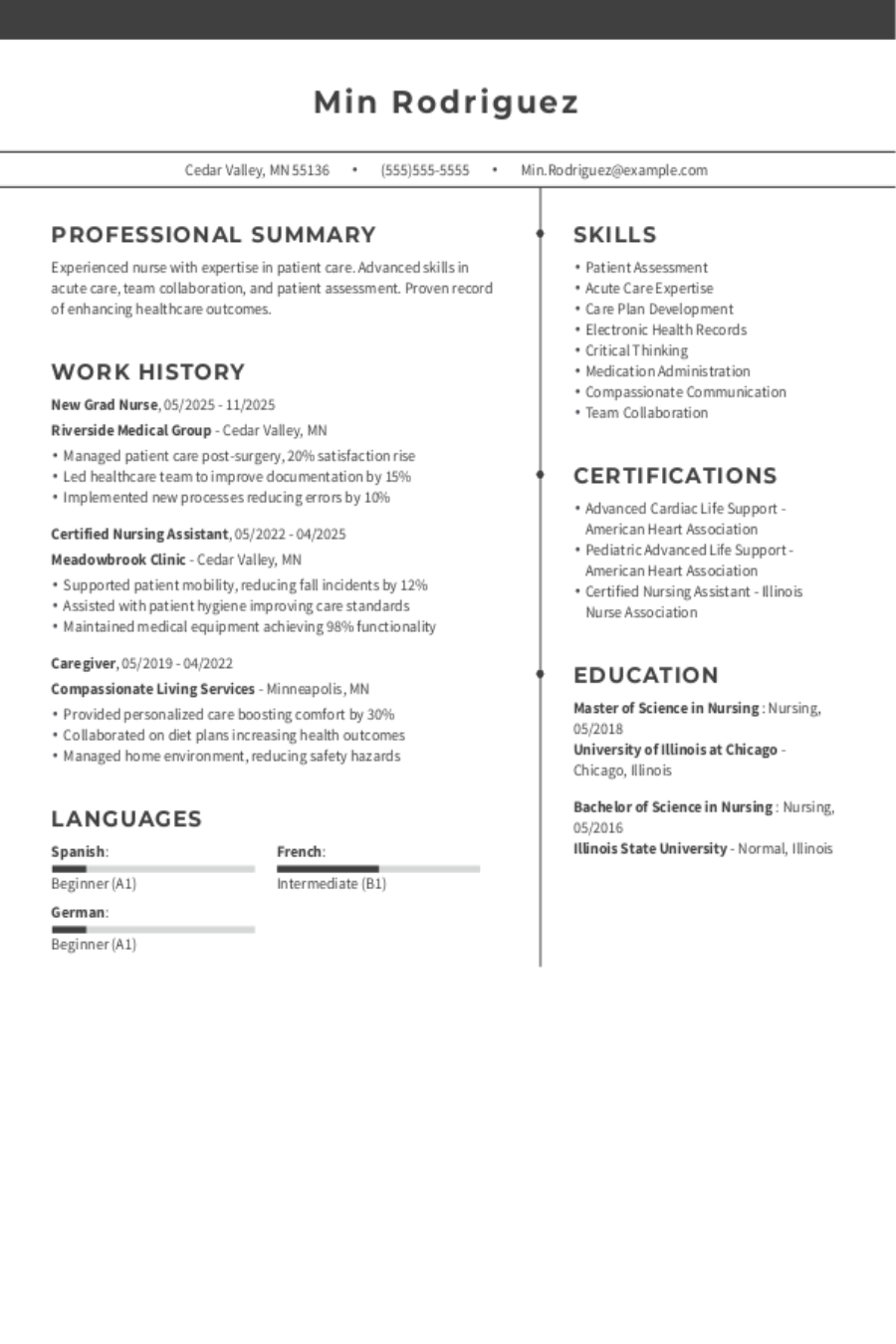Popular After School Teacher Resume Examples
Entry-level after school teacher resume
An entry-level resume for an after school teacher should focus on relevant educational background, volunteer experience, teaching skills, and any certifications to highlight capability despite limited professional history.
Focuses on goals: The applicant demonstrates a strong commitment to professional growth, reflected in their innovative program designs and proven ability to improve student engagement and performance in after-school settings.
Places skills over experience: The functional resume format is strategic for this entry-level after school teacher as it highlights skills like curriculum development and student engagement over limited experience.
Mid-career after school teacher resume
A mid-career after school teacher's resume should emphasize a combination of teaching experience, relevant skills in child development, and ongoing professional growth to appeal to potential employers.
Begins with a powerful summary: This resume starts with a strong professional summary that highlights the applicant's dedication to improving student engagement and their proven experience in curriculum development.
Encourages quick scanning: A clean layout highlights qualifications effectively, allowing potential employers to quickly grasp achievements such as improving student engagement and developing innovative programs.
Experienced after school teacher resume
An experienced after school teacher resume should highlight key achievements, teaching philosophy, and progression in roles to clearly illustrate their growth and impact in education.
Embraces modern design: This modern resume template effectively showcases the job seeker's innovative teaching approach, highlighting their commitment to student engagement and community involvement while presenting a professional brand that resonates with prospective employers.
Highlights experience: The resume's opening summary effectively emphasizes the job seeker's 14 years of experience in youth education, showcasing their ability to improve student engagement and learning outcomes. This sets a confident and professional tone for the entire document.
No experience after school teacher resume
A resume for an applicant with no experience should highlight relevant skills, volunteer work, and personal projects to showcase their potential and commitment to the position of after school teacher.
Leads with education: The applicant's strong academic background in education lends credibility to this resume and supports the candidate's key skills.
Draws from diverse experiences: Including extracurricular activities and volunteer work improves a resume by demonstrating commitment, diverse skills, and valuable experiences that contribute to a well-rounded profile in education.
More resume examples
After School Teacher Resume Template
Looking to create a standout document? Use this after school teacher template as your base and personalize it with your own experiences and accomplishments for maximum impact.
Olivia Zhang
Parkview, MO 64163
(555)555-5555
Olivia.Zhang@example.com
Professional Summary
Passionate educator with 8 years' experience improving youth programs. Skilled in enhancing student engagement and academic success. Recognized for innovative teaching strategies and leadership.
Work History
After School Teacher
Star Learning Center - Parkview, MO
January 2023
- Increased student engagement by 30%
- Organized weekly educational games
- Enhanced academic performance by 20%
Youth Program Facilitator
Bright Futures Foundation - St. Louis, MO
May 2019 - December 2022
- Led activities for 40+ children weekly
- Developed personalized learning plans
- Improved retention rates by 15%
Child Development Assistant
Children's Day Academy - Parkview, MO
January 2017 - April 2019
- Assisted in classroom management
- Supported instructional differentiation
- Organized 4 annual family events
Skills
- Classroom Management
- Child Development
- Communication
- Student Engagement
- Differentiated Instruction
- Curriculum Design
- Digital Literacy
- Program Development
Certifications
- Certified Childcare Professional - National Childcare Association
- CPR and First Aid - American Red Cross
Education
Master of Education Educational Leadership
Midwest University Champaign, Illinois
May 2016
Bachelor of Arts Early Childhood Education
Northern Illinois University DeKalb, Illinois
May 2014
Languages
- Spanish - Intermediate (B1)
- French - Beginner (A1)
- German - Beginner (A1)
Writing Your After School Teacher Resume
Having explored these effective resume examples, you’re now prepared to dive into the process outlined in how to write a resume. We will guide you through each section step by step, ensuring you have all the tools needed for success.
List your most relevant skills
An effective skills section on your after school teacher resume is important for showcasing your qualifications. Highlight relevant abilities like lesson planning, classroom management, and communication by using keywords from the job listing that demonstrate your fit for the role and help ATS recognize your abilities.
Incorporating these keywords effectively positions you as an applicant who understands the requirements of an after school teaching position. This helps both human recruiters and automated systems see that you have the right skills to contribute positively to their program.
Example of skills on an after school teacher resume
- Passionate about fostering a positive learning environment for students of diverse backgrounds
- Experienced in developing engaging lesson plans that cater to individual learning styles
- Strong communicator with the ability to build rapport with students and parents
- Organized and adaptable, able to manage multiple activities effectively
Including a balance of hard and soft skills in your resume shows you’re prepared for the technical demands of teaching while also having the ability to connect with students and create a positive learning environment.
Highlight your work history
Your work experience section should highlight not just what you did, but how well you did it. Focus on specific achievements—like improving student engagement or developing innovative lesson plans—that showcase your teaching skills and passion for education.
For each job entry, include key information such as your title, the name of the educational institution, and the dates you were employed. This allows potential employers to quickly assess your background and experience in an educational setting, establishing your credibility as a professional after school teacher.
Example of an after school teacher work experience entry
- After School Teacher
Bright Futures Learning Center - San Diego, CA
August 2021 - June 2023 - Develop and implement engaging lesson plans for groups of up to 20 students, fostering a positive learning environment that promotes creativity and critical thinking
- Facilitate homework assistance and tutoring sessions, resulting in a 30% improvement in student grades over the academic year
- Organize extracurricular activities and educational field trips, improving student engagement and enjoyment of learning outside the classroom
- Collaborate with parents and staff to identify individual student needs, providing tailored support that increased overall satisfaction by 25%
- Train new teachers on effective classroom management strategies and curriculum development, contributing to a smoother onboarding process
Aim for clarity in your resume bullet points. Use concise phrases that highlight specific achievements while providing enough context to showcase your skills and impact effectively.
Include your education
The education section of your after school teacher resume should list your academic credentials in reverse-chronological order starting with the most recent degree. Include any degrees, diplomas or relevant certifications while omitting your high school diploma if you have a higher-level qualification. Highlighting honors or notable achievements can improve this part of your resume.
If you are currently pursuing a degree or have incomplete education, indicate your highest level completed along with an expected graduation date. Including bullet points to showcase relevant coursework or significant academic accomplishments is especially helpful for those who are students or recent graduates as it emphasizes their educational background.
Common certifications for an after school teacher resume
- Child Development Associate (CDA) – Council for Professional Recognition
- Certified Youth Sports Coach (CYSC) – National Alliance for Youth Sports
- First Aid/CPR Certification – American Red Cross
- Teaching English as a Foreign Language (TEFL) – International TEFL Academy
Showcase publications and research
As an after school teacher, your resume may be improved by including a publications section on your resume that demonstrates your commitment to education and professional development. Publications reflect not only your knowledge but also your engagement with current educational theories and practices, establishing you as a credible resource in the field.
When deciding how to present your publications, create a dedicated section on your resume if you have multiple works that illustrate your expertise. If you have just one or two notable pieces, consider integrating them into sections such as education or relevant experience.
Example of a publications section
- Smith, J. & Brown, L. (2024). "Improving Learning Through Play: Techniques for After School Programs". Journal of After School Education, 16(1), 22-35.
- Johnson, A., Lee, T., & Harris, M. (2023). "The Impact of After School Programs on Student Achievement". Educational Research Quarterly, 9(2), 45-60.
- Research Contributor, Creative Learning Network (2022–2023). "After School Arts Initiative: Project Participation". Facilitated workshops improving creativity in students.
- Chen, H., Johnson, A., et al. (2022). "Collaborative Strategies in After School Education". Journal of Educational Innovation, 30(4), 150-165.
Sum up your resume with an introduction
Creating a compelling profile section for your resume is important as it serves as your first impression to potential employers. This section should succinctly summarize who you are, showcasing your qualifications and what makes you a strong applicant for the position.
If you have significant experience, a professional summary is ideal for highlighting key achievements and skills that align with the job description. Less experienced educators may write a goals-focused resume objective instead.
Professional summary example
Enthusiastic after school teacher with over 5 years of experience fostering a supportive and engaging learning environment. Demonstrated success in designing innovative educational programs that improve student development and promote social skills. Adept at building positive relationships with students, parents, and staff to create a collaborative community focused on growth.
Resume objective example
Enthusiastic after school teacher eager to use strong communication and creativity skills to foster a positive learning environment. Aiming to engage students through innovative activities and collaborative projects, contributing to their academic growth and personal development.
As an after school teacher job seeker, your resume profile should be concise and packed with essential information. Aim for three sentences that highlight your most relevant skills and experiences. Remember, you can elaborate further in your cover letter if needed.
Add unique sections to set you apart
Including optional resume sections can significantly improve your application for after school teacher roles by highlighting your unique qualifications. These sections allow you to showcase attributes that set you apart from other job seekers, making your resume more memorable.
By incorporating relevant hobbies and volunteer experiences, you provide insight into your personal values and teaching philosophy. For instance, if you spend time mentoring youth or engaging in community service projects, it illustrates your commitment to education and development.
Three sections perfect for a after school teacher resume
- Educational certifications: Holding relevant certifications reflects your dedication to education and teaching methodologies. Include any certifications related to child development or educational practices, highlighting the institution and year obtained.
- Lesson planning experience: Demonstrating effective lesson planning showcases your ability to create engaging learning environments. Outline specific teaching strategies you've developed, subjects taught, and any notable student outcomes.
- Community involvement: Engagement with the community illustrates your commitment beyond the classroom. Detail volunteer work or programs you’ve initiated that support students or families, emphasizing collaboration and impact.
5 Resume Formatting Tips
- Choose a format that matches your career stage.
Choosing the right resume format is important for showcasing your qualifications. If you have substantial experience, a chronological format effectively highlights your career growth.
For those just starting out, consider a functional format to emphasize skills over job history. A combination approach can also work well if you have relevant experience and transferable skills to highlight. - Pick a smart resume template.
Using a professional resume template improves readability and streamlines formatting, allowing your qualifications to stand out at first glance. Should you choose a custom layout, ensure it stays clean and uses fonts that are easy to read, which will help make a great impression on potential employers.
- Select an appropriate font.
For improved readability, opt for a clean professional font on your resume. Fonts like Arial, Calibri, or Georgia are excellent choices that ensure clarity and maintain a polished appearance.
- Use consistent formatting.
Ensure your resume is well-structured with aligned text and uniform margins. This creates a polished look that makes your application stand out to potential employers.
- Keep your resume to one or two pages.
When crafting your resume, remember that resumes should be one page long. This approach helps you present relevant experience clearly and concisely. If you have extensive experience, ensure every word counts and focus on the most significant information.
Tools for Your Job Search
Are you excited to apply for that after school teacher position? Before submitting your application, make sure to use our ATS Resume Checker. This essential tool offers insights into how effectively your resume meets the criteria set by automated systems used for initial screenings in educational settings.
Looking to elevate your resume even further? Our AI Resume Builder provides tailored content recommendations specific to your teaching background, along with professionally designed templates that allow your skills and experiences to stand out to hiring committees.
Frequently Asked Questions
Last Updated: September 30, 2025
Yes, a cover letter is important. It adds depth to your resume by allowing you to express what excites you about the after school teacher role and how your experience makes you an ideal fit. Crafting a thoughtful cover letter can open doors for communication with employers, so take the time to write a cover letter that stands out.
For a hassle-free approach, use our AI Cover Letter Generator. It creates tailored, effective cover letters in minutes, offering various cover letter template options that perfectly match your resume. This tool simplifies the writing process while improving your job application strategy significantly.
A resume is a concise document, typically one to two pages long, focusing on your skills and experiences relevant to a specific job. In contrast, a CV (curriculum vitae) can extend several pages and offers an in-depth look at your academic background, research contributions, publications, and professional experiences.
You should use a CV when applying for positions in academia or specialized fields such as law and medicine. If you need assistance creating a tailored CV that stands out, our online CV Maker is the perfect solution. With various CV templates designed for different industries and career levels, you can easily craft a professional document that meets your needs in minutes.
Absolutely, skills such as "classroom management" and "curriculum development" are essential on after school teacher resumes. Reviewing job descriptions can help identify additional key phrases that employers prioritize.
An active LinkedIn profile is important for an after school teacher's job search. It allows you to connect with other educators and showcase your teaching skills effectively to potential employers.
After school teachers often begin their careers as teaching assistants or volunteers. With further education and experience, they can advance to lead teacher roles or specialize in areas like curriculum development or program management.
Was this information helpful? Let us know!
Leisha is a career industry editor dedicated to helping job seekers excel in their careers.
More resources

How to Make a Canadian Resume (Format, Template + Examples)
Creating a Canadian resume is key to getting a job in Canada. ...

How to Write a Resume for an Internal Position (Guide + Examples)
Ready for a new role within the same company? We ll help you...

The Great Workplace Reckoning: How 2025 Burned Out Workers & What’s Next for 2026
The workforce spent much of 2025 in survival mode navigating ...

Law School Resume: Examples, Templates and Tips
Check out our resume examples for help getting your law school...



